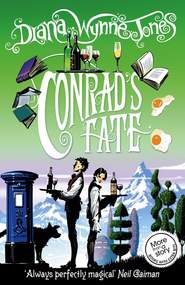По всем вопросам обращайтесь на: info@litportal.ru
(©) 2003-2024.
✖
Year of the Griffin
Автор
Год написания книги
2019
Настройки чтения
Размер шрифта
Высота строк
Поля
He swung himself into the saddle. Filbert’s great wings spread and clapped. Wermacht ducked as horse and rider plunged up into the air, leaving Corkoran staring upwards in consternation.
“Wermacht,” Corkoran said with his teeth clenched, and too quietly, he hoped, for the students around the statue to hear, “Wermacht, you have just lost us at least a thousand gold pieces. I don’t know how you did it, but if you do anything like that again, you lose your job. Is that clear?”
CHAPTER THREE (#ulink_2ed14f15-288a-5102-a276-33c4c4ed9453)
Griffins’ ears are exceptionally keen. Elda’s had picked up what Corkoran said to Wermacht. Ruskin had heard too. His large, hair-filled ears had evolved to guide dwarfs underground in pitch dark by picking up the movement of air in differently shaped spaces, and they were as keen as Elda’s. He and Elda told the others.
“How marvellous!” Olga stretched like a great blonde cat. “Then we can get Wermacht sacked any time we need to.”
“But is that marvellous?” Elda asked, worried. “I think I ought to stand on my own four feet – I think we all ought to – and deal with Wermacht ourselves.”
This struck the others as being far too scrupulous. They attempted to talk Elda out of it. But by the time they had carried the hamper of oranges and the half-empty hamper of lunch to Elda’s concert hall, their attention was on Felim instead. Something was wrong with him. He quivered all over. His face was grey, with a shine of sweat on it, and he had stopped speaking to anyone.
Elda picked him up and dumped him on the concert platform, which now served as her bed. “What’s the matter? Are you ill?”
“Something in the hamper disagreed with him,” Ruskin suggested. “Those prawn slices. They’re still making me burp.”
Felim shook his wan face. “No. Nothing like that.” His teeth started to chatter and he bit them closed again.
“Then tell us,” coaxed Claudia. “Maybe we can help.”
“It does quite often help to tell someone,” Lukin said. “When I’ve had a really bad row with my father, I nearly always tell my sister Isodel, and you can’t believe how much better that makes me feel.”
Felim shook his head again. He unfastened his mouth just long enough to say, “A man should keep his trouble locked in his breast,” and clamped it closed again.
“Oh, don’t be so stupid!” Olga cried out. “People are always saying that kind of thing where I come from too, and it never did anyone a bit of good. One man I knew had a fiend after him and he never even told the magic-user in our – in our – anyhow, the magic-user could have helped him.”
“Besides, you aren’t only a man, you’re our friend,” said Elda. “Is it a fiend?”
“No,” gasped Felim. “Assassins. If the University has sent a demand for money to all families, then the Emir will learn that I am here and assassins will come.”
“But didn’t you tell Corkoran that the wards of the University would protect you?” Ruskin demanded.
“So I may have. But how do I know? I have not enough wizardry yet to know if the wards are strong enough,” Felim said desperately. “Assassins are magic-users. They are also deadly with weapons. I have practised all week with the rapier, but I know this is not enough. They may break the wards and enter here. I am promised horrible magical tortures so that I die by inches. What do I do?”
Ruskin’s face was, by this time, almost as grey as Felim’s. “Forgemasters are magic-users too,” he growled. “How strong are these wards?”
Everyone looked at Claudia. She came and put her hands calmingly on Felim’s shaking shoulders. “Steady. Does anyone know any divination spells?”
There was a long silence and then Lukin said, “I think we do those next term.”
“A bit late. Right,” said Claudia. “So we can’t find out if the wards here will protect him—”
“And tell no one else, tell no one else!” Felim almost screamed. “This is a shame I can hardly bear!”
“All right,” said Claudia. “But we can quite easily put protection spells on you ourselves, you know. It’s just a matter of finding out how to. There must be books in the Library about it. Let’s go and look.”
“Er – I hate to say this,” Lukin said, “but we have to go and take notes about herbs from Wermacht. Five minutes ago, actually.”
“Library straight after that then,” said Elda. “Stick in our midst, Felim, and if any assassins turn up, we’ll defend you. I can be quite dangerous if I try.”
“I – I am sure you can,” Felim agreed, with a quivering sort of smile.
When they tiptoed hurriedly into the North Lab, Wermacht was already dictating notes to students and healers about the virtues of black hellebore, but his manner was decidedly subdued. Seeing the six belated students, he did nothing but pull his beard and mutter something that might have been “Better late than never!” Even when Elda knocked over a desk, trying to be unobtrusive, all he did was raise a sarcastic eyebrow. He did not seem to notice that Felim just sat there, unable to concentrate on black hellebore, or on foetid hellebore either.
“That was a relief!” said Claudia as they shot outside afterwards, dragging Felim with them. “Now. Library.”
They hastened across the courtyard to the grand and lofty Spellman Building. The Spellman Building, so one of the innumerable pieces of paper they had been given when they first arrived informed them, was the oldest part of the University, designed by that Wizard Policant whose statue stood in the courtyard. Once it had contained the entire University. Now its lower floor contained the Council Chamber, the main lecture hall and the University office, all ancient stone rooms where generations of student wizards had once sat learning spells. The upper floor now held bachelor quarters for the wizards who lived in the University, and the Library. Elda led the rush up the great stone stairway, hardly sparing a thought for the fact that her claws were scraping stone steps that had been climbed by a thousand famous wizards. Up to now, this had awed her considerably, but she was in too much of a hurry just then.
The librarian on duty winced a bit as Elda shoved through the swing doors, followed by a gaggle of humans and a dwarf, and hurriedly strengthened the stabilising spells. The Library was spacious enough for humans, with its high ribbed ceiling and shapely clerestory windows, but the gaps between the mighty oak bookcases had only been made wide enough for two wizards in robes to pass comfortably. Elda filled the gaps, and her wingtips tended to brush the marble busts of former wizards on the ends of each bookcase. The librarian watched nervously as the group made for the Inventory.
The Inventory was a magical marvel. It looked like a desk with a set of little drawers above it. You picked the special quill pen out of the inkwell on the desk, which activated the magic, and then wrote on the parchment slotted into the sloping surface. You could write the author of a book, or its title, or just the general subject you wanted, and when you had, the Inventory hummed a tune to itself and, after a second or so, slid open one or more of its little drawers. Each drawer was labelled on the outside with the name of one of the wizards whose marble busts stood on the ends of the shelves. Inside, you would find a card with the name of the book or books you needed on it, its author and its shelf number. The snag was that the busts of the wizards were not labelled. You had to know which statue was Eudorus, or Kline, or Slapfort and so forth, before you could begin to find the book.
The librarian watched more and more uneasily as heads bent over the desk and drawers slid in and out. Unfortunately, it was the griffin who knew the names of the busts. She seized card after card, hooked it to a talon and set off on three legs to plunge between bookcases and back out again carrying a book. Sometimes she got the wrong side of a bookcase and backed out without a book, to plunge into the next gap along, but in either case, the bust on top lurched and wobbled.
Meanwhile, the whispers round the Inventory grew more agitated. Several of the students glanced towards the librarian. Eventually the dwarf announced, in a loud, buzzing whisper, “Well, I’m going to ask about it,” and came marching up to the librarian’s desk. He put his chin on top of it and asked, quite politely, “Don’t you have Policant’s Philosophy of Magic? I can’t seem to find it in the Inventory.”
“Well, no, you wouldn’t,” the librarian explained. “That’s an old book. We don’t keep those on the shelves.”
“And—” the dwarf propped a large hand on the desk to consult a crumpled list “—I can’t find The Red Book of Costamaret, Cyclina on Tropism, or Tangential Magic either. Are those not on the shelves too?”
“That’s right,” agreed the librarian. “We don’t bother with any of those these days because none of the tutors recommend them to students. The courses nowadays don’t go in for theory so much.”
“But that’s ridiculous!” Ruskin boomed.
“Hush,” said the librarian. “People are trying to work here.”
Most of the students sitting at the tables down the centre of the Library were looking up indignantly. Ruskin glanced at them and scowled. But he was here to distract the librarian, not to cause a disturbance, so he continued in a hoarse, growling whisper, “Why don’t the courses go in for theory? Does that mean you won’t let me have these books then?”
“You’ve no need for them,” the librarian said patiently. “You’re a first-year student. You’ll have enough to do simply learning the practical things.”
“That is not true.” Ruskin began beating the hand with the list in it on the desk. The librarian watched the desk tremble, apprehensively. “I am a dwarf. Dwarfs know the practical stuff. And I have an enquiring mind. I want to know the other part, the thusness of how, the colour and shape of the ethos, the smell of the beyond. Without knowing this, I am setting up my anvil on sliding shale. By denying me these books, you are asking me to found my forge on a quaking bog!”
“I am not denying you those books,” the librarian said hastily. “I’m simply explaining why they’re not on the open shelves. Just tell me which one you want and I’ll call it up for you. Policant’s Philosophy, you said?”
Ruskin nodded, the bones in his beard plaits rattling on the desk. “And The Red Book of Costamaret,” he added, thinking he might as well make this distraction worthwhile.
“Very well.” Disapprovingly, the librarian activated an obscure spell.
Ruskin, watching keenly, saw that the spell was something very advanced that he would never be able to operate himself. There were codes and signatures in it and arcane unbindings. Regretfully, he gave up the idea of sneaking in here at night and having a good rummage through the secrets of the University. He watched the air quiver between the librarian’s hands, and the quiver become a pulsing. Eventually, two large leather books slid out of nowhere on to the wooden surface in front of his face. They smelt divinely to Ruskin of dust and old gloves. “Thank you,” he rumbled. He sneaked a look towards the Inventory. The others had by no means finished there. Elda was just dashing off with three more cards skewered to her right front talons. He raised his list. “And Cyclina on Tropism, Tangential Magic, Paraphysics Applied, Thought Theorem, Dysfunctions of Reality, Universa Qualitava and – er – The Manifold of Changes,” he read in a long throaty grumble.
“All of them?” the librarian exclaimed.
“Every single one, please,” Ruskin husked. “And if you have any others on the same lines—”
“Your student limit is nine books,” the librarian snapped, and began making gestures again.
By the time the steep pile of books arrived – Tangential Magic was enormous and some of the rest almost as mighty – the others were making their way to the librarian’s desk, each with a pile of slimmer volumes, to have them checked out. The librarian eyed the advancing forty-five books and said, “I shall have to report this to your tutor.”











